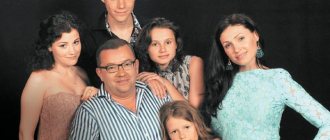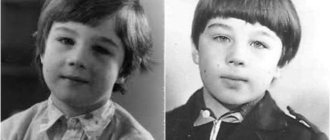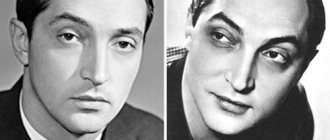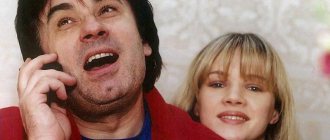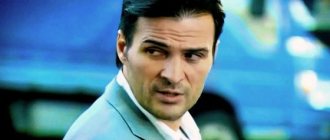Biography
“I’m not Maisky. I had absolutely no connection with my character and generally try not to let him inside me: I left the set and forgot. I don’t have a split personality, and I distance myself as much as possible from my hero outside of work. Although it’s better than digging trenches or pulling wires or sitting in the office from dawn to dusk.”
View this post on Instagram
A post shared by @paul_shuvaev on Nov 28, 2020 at 12:22pm PST
Pavel Shuvaev
This is how Pavel Shuvaev talks about the role that made him a screen star and the object of admiration for the female half of the audience. The actor emphasizes that one should not equate cinema with reality; he does not intend to remain in this image forever. However, for now the brutal operative from the series “Trace” is his “companion” in life. This means that we must constantly look for new facets of this personality, grow and develop.
Personal life of Elena Potanina
Elena is a girl whose personal life is little known. She does not seek to make her victories and defeats public, leaving her life under lock and key, the code for which is known only to her.
Recently there was a rumor that Elena Potanina got married. A lot of questions started popping up online. Who is the husband? Who and when did Elena marry? But, as it became known, this was a false rumor.
As Elena Potanina says (“What? Where? When?”), she has a busy personal life, but she has not yet gotten married. And it’s not going to happen anytime soon.
Many were sure that Elena Potanina married Ilya Novikov, a strong player of “What? Where? When?".
Childhood and youth
Pavel was born on April 23, 1977. Shuvaev is a native Muscovite. Recalling his childhood, the actor said that until the 4th grade, while he lived with his mother, he was a diligent good boy and brought good grades from a school with a literary bias. Everything changed when Shuvaev Jr. moved to live with his father’s family and began attending an ordinary educational institution. Lessons were soon abandoned, and the diligent student turned into a truant.
View this post on Instagram
A post shared by @paul_shuvaev on Apr 23, 2020 at 4:16am PDT
Actor Pavel Shuvaev
At the age of 11, Pavel fell from a tree and received a serious spinal injury. At the insistence of his father, an Honored Master of Sports in gymnastics, after recovery the young man enrolled in the sports section. In the last grades of school, bodybuilding became Shuvaev’s real hobby. The high school student has repeatedly become a prize-winner in competitions in this sport. And now, both in the frame and behind it, the artist’s muscles and naked torso are the subject of special attention from those around him.
The injury made itself felt, which was the reason why the guy managed to avoid serving in the army. But he went to the Federal Security Service, where he signed a 3-year contract and worked in the Alpha Aegis division. Shuvaev is liable for military service. After contract service, Pavel, under pressure from his parents, went to get a higher education. First he entered Moscow State University, where he chose the Faculty of Law.
View this post on Instagram
A post shared by @paul_shuvaev on Feb 3, 2020 at 6:25am PST
Pavel Shuvaev on stage
But studying there seemed too boring to him. The young man dropped out of the university and went to the Institute of Physical Education. This son’s decision greatly upset his parents, so he had to change his “profile” again and become a student at Moscow State University. But this time Pavel went to the Faculty of Economics. After receiving his diploma, Shuvaev went to the Moscow State Conservatory named after Pyotr Tchaikovsky. Here the future “special forces major” studied on a vocal course.
During this period, Pavel's long-standing desire to try his hand as an artist awoke. The appropriate appearance and impressive growth favored this. Shuvaev entered Alena Rozhenko’s theater studio, after which he was accepted into the troupe of the New Adam theater and worked in Sergei Mikulsky’s show.
Misha Maisky
The Moscow Virtuosi chamber ensemble, founded by Vladimir Spivakov in 1979, opened an anniversary concert series with the participation of famous soloists. The first to congratulate his colleagues was the famous cellist Misha Maisky. A student of Mstislav Rostropovich and Grigory Pyatigorsky, a laureate of prestigious competitions, who never received a completed higher education, Misha Maisky is a musician with an incredible destiny, which could well become the script for some Hollywood “fairy tale.” In 1970, he was arrested on the basis of a denunciation and served a year and a half, after which he left for Israel. Since then, he considers his real birthday to be the moment of his departure from the Soviet Union. Correspondent Maria Zueva met with Misha Maisky especially for Izvestia.
Question: This year you celebrated your 60th birthday. Did the holiday chores turn out to be tiring for you or did they not disrupt your usual work rhythm?
-answer: Of course, it is very tiring. In general, I think all this is a misunderstanding and a mistake in my birth certificate, so I can’t believe that I am 60 years old. I always say, half-jokingly and half-seriously, that I count my age from my second birthday - November 7, 1972. On the next anniversary of the Great October Socialist Revolution, when there was a parade on Red Square, I arrived by train in Vienna on the way to Israel and actually started a new life. Then I didn’t speak a word of English, I hadn’t played the cello at all for two years, I didn’t have a decent instrument and no one knew me in the West. The condition is like after a shock, when people are forced to learn to walk and talk again. 36 years have passed since that moment, and that’s about the age I feel myself to be.
All the so-called anniversary “festivities” in my honor were not organized by me personally, I simply did not oppose them too much, since they were related to music. I do it all the time, with love, and the only difference is that the organizers use the anniversary as an excuse for me to be “in the arena all evening” and try to squeeze all the juice out of me. And for me, every concert is the most important performance in my life. I realize that there are many people in the room who are hearing me for the first and, perhaps, the last time. At my anniversary party in January, I played the world premiere of a concert written for me by Benjamin Yusupov. Wonderful composer, wonderful work. I have performed it several times since then and it has been a huge success. I played another three-hour anniversary program at the Verbier festival - with my daughter Lilia and Martha Argerich. By the way, as for round dates, the only one that I really appreciate and celebrate this year is the 30th anniversary of our first official concerts with Martha.
Q: How did you manage to make recordings of Mstislav Rostropovich’s master classes?
-o: I officially started studying with Rostropovich after my father suddenly died. I just turned 18 years old, and Mstislav Leopoldovich helped me a lot in everyday life. He practically became a second father to me. During our last meeting, he himself told me: “You were like a son to me.” To which I added with a smile: “Prodigal son.”
When I entered the Moscow Conservatory, I bought a Sony portable tape recorder with a small prize from the Tchaikovsky Competition. And I realized what I had wanted for a long time. I couldn’t understand why no one was recording Rostropovich’s master classes; it seemed to me a crime that they were disappearing without a trace. I began to regularly record his lessons; some of those recordings were preserved and were used, for example, by the English cellist Elizabeth Wilson, a student of Mstislav Leopoldovich, who wrote a book about him. She also made a short film, which partially uses my recordings.
Unfortunately, then my initiatives ended in failure. After the fourth year, Sony fell into disrepair, and I could not find normal equipment anywhere, until at a flea market a young man suggested that I purchase certificates for the Beryozka store, where I could buy a new tape recorder. And then I was arrested. All this, as far as I know, was organized in advance. Two years before what happened, my sister emigrated to Israel, and the authorities decided that I would certainly follow her. And the fact that I studied at the Moscow Conservatory with Rostropovich and could receive a free Soviet education greatly irritated them. I was a good student, a laureate of the Tchaikovsky Competition, and they couldn’t just kick me out of the conservatory. Of course, they ruined my life as best they could: they canceled concerts, and, naturally, they didn’t let me go abroad, and they stopped paying me a stipend, remembering that I once didn’t go “to the orchestra.” But I continued to study, and it became clear that if nothing happened, then I would graduate from the conservatory in no time. The easiest way to get rid of me was through the Butyrka prison, because then I would automatically lose the right to be a student at the Moscow Conservatory. I ended up in Butyrka. Nevertheless, I am eternally grateful to the Soviet authorities for such a unique experience. Even though I was left without a diploma, I received an excellent informal education.
Q: Where did you serve your sentence?
-o: First, four months in Butyrka prison, and then fourteen months in the Gorky region, in the village of Pravdinsk, at the construction of a pulp mill, where they produced paper for the Pravda newspaper. I loaded 10 tons of cement a day. Built communism. Alas and ah - he built it unsuccessfully. Maybe it was my fault that I loaded the cement somehow wrong... And after the labor camp, in order not to end up in the army, I was forced to spend two months in a mental hospital.
Q: How did you manage to recover from life as a prisoner?
-o: It's difficult. But I'm lucky. There are plenty of cellists who have better hands than mine. But the fact of the matter is that the hands are not the most important thing. Musicians often exaggerate the importance of hands, as well as the importance of the quality of the instrument. Of course, both are important. And the head is very important. But, in my opinion, there is something even more significant, and the difference between very good and great artists lies precisely in this last phase, when the music comes not from the head, not from the hands, not from the instrument, but from the heart.
Q: For every concert you wear a certain Indian talisman. What is its significance?
-o: I haven’t worn a tailcoat or a bow tie for many years. Instead of a tailcoat, there are comfortable loose shirts without buttons, and instead of a bow tie, there is jewelry with an antique-cut diamond and many other stones. I don’t even remember what some of them are called in Russian. This “pendant” is about 250-300 years old and was once worn on a turban. In India, entire works have been written about the combination of stones on my “talisman”, but I just like it. Although I once forgot to take it to a concert, it didn’t make me play any worse.
Q: You are often reproached for having too much Misha Maisky in your performance...
-o: But no one can accuse me of being a fake. Of course, I try to interpret the author's text as accurately as possible. For me, the composer is much more important than the performer, but the individuality of the performer is also very important. No matter how many indications there are in the notes, it is impossible to note everything. Performers must be able to read between the lines and interpret the composers' thoughts in their own way. That is why there are so many different recordings of the same works. Otherwise, you could just use the computer.
Unlike some of my colleagues, I do not pretend to know not only how Bach’s music sounded in his time, but also how Bach himself heard it. There is a wonderful anecdotal story. Maestro Otto Klemperer and a very famous singer performed a Bach oratorio. At the first rehearsal, the singer sang slightly differently than what was written in the notes. To which Klemperer asked: “What are you doing there?” The singer replied: “You know, maestro, last night in a dream I met Bach, who told me that you are the most brilliant and you can sing it differently than I wrote.” The next day the same story is repeated - the singer plays different notes. Klemperer stops the orchestra again and says: “Yesterday in a dream I also met Johann Sebastian Bach. He told me he doesn't know you."
Q: At the “Moscow Virtuosi” concert you combined the roles of a soloist and, to some extent, a conductor. Have you ever had a desire to take up conducting, as many soloists do today?
-o: I have a lot of desires! But desire is one thing. Skill is another thing. Sometimes I am even half-jokingly, half-seriously proud that I am almost the last of the Mohicans, one of the few performers who managed to resist their desire to pick up the conductor’s baton. I believe that when a person goes on stage, it is a very serious commitment to people. I barely have time to combine playing the cello with my personal life and family concerns. To do this you need to be not just a talented person, but a genius. And there are very few geniuses. There are many people who think they are geniuses. But that's another problem.
As a result, quality usually suffers from quantity. I prefer to do less, but as best as possible, so I don’t conduct, I don’t teach, I don’t want to get involved with my own festival. Even in the cello repertoire there is a lot of music that I still haven’t played. When I am reminded that I have turned 60 years old, I feel that I have reached exactly the middle of my life - just like in Israel, for example, when wishing all the best on your birthday, they say: “until 120!” Maybe in the second half of my life I will be able to find time to eliminate all my “omissions” and even for some other adventures.
Music
In the late 90s, Pavel organized his own musical group, which was called “OddisS”. The artist continues to write music and perform to this day. The team’s credits include the album “Young Gods,” initially called “Poison” (a video was shot for the composition of the same name), released in 2008 and distributed in 34 countries around the world. The presentation of the album took place at a concert in St. Petersburg.
Pavel Shuvaev and the group “OddisS” - “Poison”
“I’m honestly not good at styles. Maybe we have metal after all? I like the definition of “epic Russian metal”. Let the listeners judge. I write what I write. And I didn’t have creative alliances with many good musicians just because they wanted to make a style. One or the other. No one has yet convinced me, although perhaps they were right.”
Pavel posts information about the group’s performances on his personal website. The musician does not have pages with photos on social networks, including Instagram. Besides music and theater. at the turn of the century, Pavel Shuvaev worked in the modeling business, for which he received high fees. But since 2002, he stopped participating in shows, as he began acting in films.
Film work
Since two thousand and two, Pavel has been actively acting in films and is often invited to television shows. Pavel Shuvaev is a lucky guy who managed to work with such masters of Russian cinema as Alexander Rogozhkin, Andrei Mikhalkov-Konchalovsky, Timur Bekmambetov. The actor gained wide popularity after his work in the series “Trace”, where he played Major Maisky. This character became one of the most popular in the film.
View gallery
Quite often, fans are interested in how Pavel Shuvaev, without any special professional education, was able to get into the films of famous directors.
His first work was “Fools’ Day” by Andrei Konchalovsky. At this time, Pavel worked in a modeling agency. He and several of his colleagues were selected during the casting. Of all the selected applicants, only Pavel Shuvaev agreed to cut his hair bald. Andrei Sergeevich appreciated Pavel’s action and even trusted him to voice his character himself.
Movies
The cinematic biography of Pavel Shuvaev began in the Alexander Inshakov Stuntmen Association. But one day, on the way to a friend’s house, the taxi he was riding in drove into a pole. The actor again injured his spine and ended up in the hospital, where he could only lie down. Having recovered from the accident, he returned to the stage.
Actor Pavel Shuvaev (still from the TV series “Lawyer”)
In 2002, a tall, handsome man (Pavel’s height is 197 cm) appeared in the melodrama “House of Fools” by Andrei Konchalovsky. For the sake of the role, Shuvaev shaved his head, which won the favor of the director, who subsequently entrusted the inexperienced actor with voicing his own role.
In an interview, Pavel says that he did not feel any discomfort on the set, even playing in the same scenes with the master of Russian cinema, Yevgeny Mironov. And the uniform of a special forces soldier, as well as the weapon in his hands, turned out to be familiar to Pavel from his previous work in the FSO. The film also stars Yulia Vysotskaya and Bryan Adams. The film won a prize at the Venice Film Festival.
Pavel Shuvaev (still from the film “Night Watch”)
In 2004, Shuvaev was cast to participate in the filming of Timur Bekmambetov’s mystical thriller “Night Watch.” The aspiring artist got a cameo role, but on the set Pavel was again lucky enough to work with the stars of Russian cinema and show business - Konstantin Khabensky, Vladimir Menshov, Valery Zolotukhin, Gosha Kutsenko, Alexey Chadov, Zhanna Friske. The film grossed $33 million at the box office.
Real success came to the actor when the detective series “Trace” was released on Russian screens, about a fictional expert service that unravels the most complex problems. Pavel Shuvaev got the star role - the charismatic former GRU special forces major Sergei Maisky, who was dismissed due to length of service and injury to subordinate the character Olga Koposova.
“Colonel Rogozina is an ideal woman, a teacher, a beloved boss,” said the artist.
Pavel Shuvaev (still from the series “Trace”)
Maisky’s prototype is a real officer from the Main Intelligence Directorate, a family man and outwardly completely different. He retired after being wounded during the Georgian-Ossetian conflict in 2008. People from the unit he commanded depict the capture team in the footage of “Trace.”
Brother Vladimir, who served in the police for 8 years, also shared his experience of investigative work with Pavel. In his youth, the actor worked as a morgue orderly, so he is relaxed about filming on location. The film was initially broadcast on Channel One and instantly attracted the attention of millions of television viewers, then moved to Channel Five. Shuvaev is one of the favorite participants in the project.
Pavel Shuvaev (still from the film “The Game”)
In the 2008 adventure comedy “The Game” by Alexander Rogozhkin, which dealt with the upcoming World Cup organized in Moscow during Soviet times, Pavel played a biker and a football fan.
In 2009, the premiere of Igor Romashchenko’s 8-episode detective series “Cruise” took place. The film tells about the owner of a large Italian holding, who opened a shipping company in Russia. An entrepreneur invites friends to celebrate this event on a ship that is setting off on a cruise along the Volga. Here, on the ship, detective events and love drama take place. Pavel Shuvaev played a similar role - the musician and leader of the ensemble Zhenya.
Biography and childhood
The legendary coach is a native Muscovite. He was born on February 11, 1938. He was followed 20 minutes later by a twin brother. The parents named the boys Boris and Evgeniy. The twins' father, Alexander Mikhailovich, was a serious political official; he worked as an accountant in the Ministry of Finance of the RSFSR. The boys’ mother, Praskovya Efimovna, was a simple woman who devoted her entire life to housekeeping and raising children. The twins had three older sisters: Vera, Anna and Galina.
Boris and Evgeny Mayorov with their mother
The Mayorov family lived in an apartment building in Sokolniki. Two brother athletes lived in the same house with them. The boys often asked their neighbor to take them to a football match. The love for sports that Bori and Zhenya showed in childhood determined their future path in life.
Outstanding captain of Spartak
The older brother studied well at school and graduated with a silver medal (a solid B in geometry prevented the young man from receiving a gold medal). Boris studied at the Moscow Aviation Technology Institute, leaving it as a certified specialist in 1961.
Personal life
The personal life of Pavel Shuvaev is not yet settled. Undoubtedly, the artist dreams of a strong family, a wife and children, but for now he is in search of the one with whom he will share his future life. The preferred female type is a student with long, thick hair, up to 170 cm tall and not a fan of high heels.
View this post on Instagram
A post shared by @paul_shuvaev on Jan 7, 2020 at 11:04am PST
Torso of Pavel Shuvaev
The actor is a follower of the military style; he comes to the set in what he wears in everyday life. In his free time, by his own admission, he only has time to sleep, go to a bar with friends, or hit a punching bag in the gym, since work on “Trace” goes on almost around the clock.
The most interesting
TOP 9 Hollywood actresses with non-standard appearance (10.01.2018)
Actresses who received the Golden Raspberry Award for Worst Actress (02/13/2020)
Apparently, the artist likes to spend all his free time with his parents and brother at the dacha, as well as with his friends. The artist is not yet in an official relationship. Sometimes he still mentions in interviews that his heart is still occupied, and he has a girlfriend.
Pavel Shuvaev now
The artist continues to star in the series “Trace,” the number of episodes of which has exceeded 2 thousand, and performs as part of a rock band at concerts. In November 2018, online fan communities spread information that Pavel had left the project. Members of the acting ensemble have left before, such as Oleg Osipov, Olga Zeiger, Nina Gogaeva, but then returned. Shuvaev himself refrained from commenting, saying that he had already said too much unnecessary things. To the delight of fans, new episodes with Major Maisky began airing in the spring of 2020.
View this post on Instagram
A post shared by @paul_shuvaev on Apr 28, 2020 at 6:05am PDT
Pavel Shuvaev in 2020
The format of the film helps not to get tired of the image after so many years: one episode - one thing, as well as warm relationships in the team and optimism. Of course, the director’s guidelines and creative palette are important. The more an actor can do, the more complete and accurate the character will be. Pavel says that he does not get used to the role, but simply works. And if the viewer likes it, it means it’s moving in the right direction.
"OddisS" plans to expand its discography with the album "Star", but the musicians have no idea when this will happen. It's all because of Pavel's constant busyness on the set. In addition, the composition of the group changes periodically.
